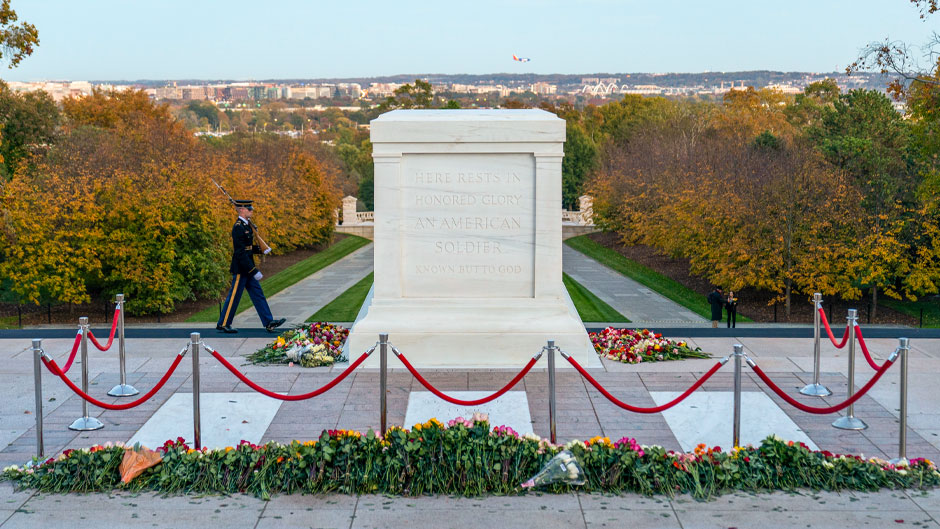This Veterans Day, first celebrated as Armistice Day to mark the end of the First World War on Nov. 11, 1918, veterans working in a range of capacities at the University of Miami reflect on how they benefitted from their military experience.
The veterans recognize that their early training—though rigorous and demanding in a range of dimensions—fostered invaluable qualities about service and their own potential and possibilities.
This Nov. 11 also marks the 100th anniversary of the creation of the Tomb of the Unknown Soldier at Arlington National Cemetery. The first “doughboy”—or infantryman—was laid to rest in the tomb on Nov. 11, 1921, three years after the end of World War I.
University of Miami Libraries (UML) is marking the day with a special tolling of the carillon bells at 11 a.m., part of the national salute. UML is also donating copies of the children’s book, “Twenty-One Steps: Guarding the Tomb of the Unknown Soldier” by Jeff Gottesfeld and illustrator Matt Tavares to its juvenile collection along with a copy to the West Lab School.
The University employee resource group, Veterans Unite, encourages those interested to join and share in the camaraderie. You are not required to be a veteran to join. Contact VeteransUnited@miami.edu.
See the tabs below to read about the five University employees featured.
-
Robert Fifer
Robert Fifer, director of audiology and speech-language pathology at the Mailman Center for Child Development, has been with the University for 31 years. A clinician administrator, Fifer most recently finished a study on the Zika virus and is currently researching long COVID-19 syndrome, especially in adolescents.
Service: U.S. Air Force, January 1976–December 1986.
Fifer wanted to be an audiologist and to serve in the military. He enrolled in the Reserve Officers’ Training Corps and received an educational deferment that allowed him to complete his master’s degree at the University of Nebraska with additional minors in military science and deaf education. As an officer, Fifer was not required to attend boot camp—his first assignment launched his learning.
“It was three months after the end of Vietnam, and my first station was at Clark Air Base in the Philippines where we still had POWs on the base and in the hospital where I worked,” Fifer said. “Even though I did not serve in the jungle, I still saw the aftermath of the war, both physical and mental, through my station in the hospital at Clark.”
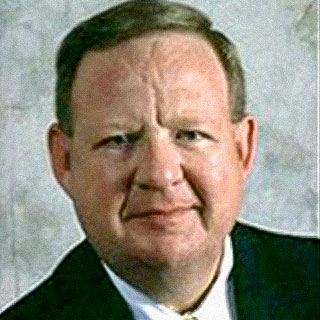 He was trained in chemical weapons strategies and to detect poisonous gas, which were still being used in that part of the world. “The smell of fresh cut hay was a warning sign—that’s what the nerve gas smelled like—so you had to get your gas mask on immediately,” he said.
He was trained in chemical weapons strategies and to detect poisonous gas, which were still being used in that part of the world. “The smell of fresh cut hay was a warning sign—that’s what the nerve gas smelled like—so you had to get your gas mask on immediately,” he said.Fifer traveled in Southeast Asia and got to see how the other half of the world lives. “My experience was life-changing. I began to recognize the differences between how I grew up and how the guy next to me in class or sitting on an airplane as an auxiliary crewman grew up,” he pointed out.
“One of the things I learned is that regardless of the country of origin, people or culture, by and large, people are people. They have common dreams and goals, they want a good life, a stable life for themselves and for their family,” he added.
Fifer continued to travel and in the 1990s began teaching about cochlear implants as an adjunct professor at the Catholic University in Buenos Aires, Argentina, and also in Bangkok, Thailand.
On Veteran’s Day, he remembers his service days and his experience on the Nebraska campus during the Vietnam War era.
“Those who had served in Vietnam were treated like dirt. It wasn’t until the first Gulf War that the attitudes toward the military began to change. And people realized that we were not mercenaries in Vietnam, that we were sent there originally for a purpose and unfortunately that purpose was lost as the war went on,” Fifer explained. “It was a long time before people began to show honor and respect for military members and what we stood for.”
During a trip to Washington, D.C., he visited the Vietnam Memorial and a passerby walked up and said: “Thank you for your service.”
“For a split second I didn’t’ know how to handle that,” Fifer acknowledged. “It’s very different now than what it was and that’s a good thing.”
-
Charles Mitchell
Charles Mitchell is a tenured professor of pediatrics in the Division of Pediatrics and Infectious disease, Miller School of Medicine. He joined the University in 1986, has been awarded and conducts NIH-funded studies on children with HIV, and has managed research projects in Africa, Brazil, and the Dominican Republic.
Service: U.S. Air Force, July 1970–August 1972.
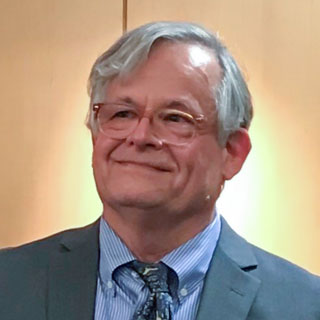 As if one boot camp wasn’t enough, Mitchell attended two six-week camps in the Air Force—and the experiences were markedly different. The first was with other officers, all in college like himself, with similar demographics.
As if one boot camp wasn’t enough, Mitchell attended two six-week camps in the Air Force—and the experiences were markedly different. The first was with other officers, all in college like himself, with similar demographics.The second training was at Lackland Air Force Base in Texas, prompted by the fact that Mitchell was sanctioned for refusing his officer commission and ordered to serve 24 months as an enlisted person.
“At Lackland, where the men were from diverse backgrounds, I got a whole different perspective on many different viewpoints,” he said. The experience fostered one of his core beliefs today that “every American should spend some time overseas, in places like Africa or portions of Asia, and really understand the way people around the world live.”
Mitchell and half of the other cadets in his officer class made the strategic decision to refuse their commissions. It was during the Vietnam era, and the government intended to issue a sanction by requiring him to serve in the enlisted ranks. Looking back, he sees it as a reward.
“In retrospect, it was one of the best times of my life. It gave me two years to grow up, two years to essentially put my head on straight and decide what I wanted to do with myself and how to do it,” he said.
Mitchell served at the Air Force veterinary hospital in San Antonio, Texas, where he took classes at the nearby Catholic college every morning and then worked 8 to 9 hours daily attending to the guard dogs. He spent the last few hours each day studying.
He completed 24 required biology credits and improved his grade point average to be able to attend medical school. Mitchell credits his supervisors, and especially the colonel he worked for, for the supportive stabilizing environment.
“I will be forever grateful to the U.S. military for that opportunity,” he said. “I am a firm believer in the dictum that every American should serve the government in some capacity for 1 to 2 years. It doesn’t have to be the military; it could be the public health service, Peace Corps, something like that. With the problems and the noise going on in modern life, whatever you want to call it, you need time apart to figure out where you’re at and where you want to go.”
That second enlisted boot camp taught him the importance of teamwork. “You become sensitive to the role that you are there fulfilling, relative to everyone else who’s in your flight group or troop,” he noted.
One instance highlighted that message. He and another trainee were called out for doing everything right during a snap inspection. The sergeants invited them to the front of the room to be celebrated, to sit in comfy chairs and offered sodas, cigarettes, etc. “It was like a scene from ‘Monty Python,’ ” he remembered. “But I saw exactly what they were up to.”
To everyone’s surprise, he got up and returned to his seat with the troop, recognizing that he didn’t want to be heralded as special or better than the others. “It brought home to me the message that they’re trying to instill in you through that type of training—while in the Air Force it’s nowhere near as tough as in the Marine Corps, it’s an attempt to create a cohesive body of people who are dependent on each other. It’s not so much that they break you down as an individual, it’s more that you begin to think about the person next to you and the people in your flight or on your team.”
That experience resonates with him today and he’s pained to think about the 750,000 in the U.S. who have died from COVID-19.
That’s more than the total number that we lost because of the Spanish Flu pandemic from 1917 to 1918 and the total number of casualties during World War II, he pointed out. “As medical professionals, we are reminded time and again that you are a servant to your patient, though you can set limits. While there are some who are caught up in their thinking about their individual freedoms, quite frankly, with a situation like this, you have to think about the person next to you and what’s important to the collective body.”
-
Alexander Urbizagastegui
Alexander Urbizagastegui is the supervisor of the Research Diving Facility, Marine Operations, at the Rosenstiel School of Marine and Atmospheric Science and formerly supervisor of UC pool operations.
Service: U.S. Navy, 1998–2002
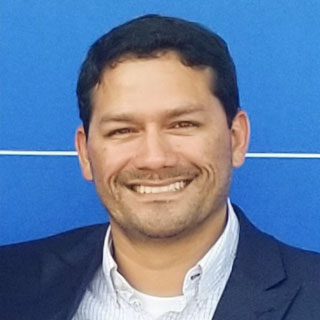 Urbizagastegui grew up in Miami with a father who “was pretty tough.” At Miami Senior High, he practiced swimming and water polo and joined ROTC because he liked the discipline of it.
Urbizagastegui grew up in Miami with a father who “was pretty tough.” At Miami Senior High, he practiced swimming and water polo and joined ROTC because he liked the discipline of it. With his background, he found summer boot camp in Chicago to be pretty easy. His ah-ha moment came during a drill. After finishing an exercise, he headed to the bathroom and returned to find his team doing push-ups as punishment for some misstep. Without a second thought, he was down on his hands and counting off reps.
“I wasn’t at fault, but just thought ‘I’m part of the team,’ so I’m doing push-ups, too,” he remembered. The drill sergeant yelled ‘Now I’m starting to see teamwork.’ And from that moment, we achieved a different level of working together. You realize that you’re not a one-person unit, that you have other people and you guys are a unit. And if one of you doesn’t make it or is holding everybody back, then we all suffer. Once you get out of boot camp, you have the mindset that you’re responsible for more than yourself, that it’s not just me—it’s my unit, it’s my shop, it’s my department. That stays with you.”
His deployment to Bahrain in the Middle East gave him a deeper appreciation of life in the United States.
“I didn’t realize how much it meant to serve in the military and how different the living standards are in the U.S. until I went overseas,” Urbizagastegui said. “When they tell you that if you see a woman in the street, don’t address her directly, because talking to her might mean that she could be stoned to death—that puts freedom into a whole new perspective.”
His military background helped him land a first job at the University as director of pool operations and later to transfer to his current position at Rosenstiel. “Even if you might not have the knowledge of a specific work environment, people know that you have the discipline, that you’ll dress appropriately, show up on time, that you’ll learn, and that you have emotional intelligence—it’s part of the training that veterans carry on to the civilian world,” he explained.
While at the University, he has taken advantage of the tuition remission benefits and earned his Master of Science in Leadership from the business school.
Urbizagastegui hopes that his two sons, ages 7 and 8, might serve in the military, but it will ultimately be up to them. “For now, I focus on teaching my kids to practice discipline and being good members of a community,” he said.
He enjoys being part of the employee resource group Veterans Unite. “By joining a group like this, you find people who have the same care and mindset, you know these people are going to be there,” he said. “You don’t have to motivate them—it’s part of who they are.”
-
Nelly V. Schaffner
Nelly V. Schaffner is an accounting supervisor for UHealth Facilities Operations and Planning.
Service: U.S. Army, January 2004—February 2006
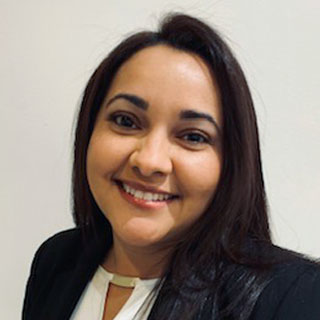 Schaffner was working parttime at a fast-food restaurant and attending classes at Miami Dade College when she stopped to chat with the military recruiter. She had only moved to the U.S. four years before and to this day she’s still not sure what motivated her to accept his advice and enlist.
Schaffner was working parttime at a fast-food restaurant and attending classes at Miami Dade College when she stopped to chat with the military recruiter. She had only moved to the U.S. four years before and to this day she’s still not sure what motivated her to accept his advice and enlist.When she arrived at Fort Jackson, South Carolina, for her 10 weeks of boot camp training, she hit a wall: “What did I get myself into? I went in blind, and it was a big shock, dealing with different people, different accents, everything was new and overwhelming,” she remembered. “But I met friends who were so supportive and whenever I would freak out, they would say ‘you can do it,’ ‘we’ll help you,’ and I felt like I had somebody there to guide me.”
She grew more comfortable and confident: “I learned that I’m able to adapt to circumstances, to look at the big picture and decide what is the one next thing that I need to do,” she said. Still, training was grueling, and Schaffner developed a stress fracture—she needed crutches to walk. Doctors told her she could get out if she wanted. But she insisted on finishing. Though she couldn’t participate fully, when it came time to scaling a wall—a challenge all her team had done—she put her crutches aside.
“I was one of the last ones to do it, the platoons were mostly gone, and the leaders were screaming at me. I don’t know how, but I managed to get over,” she remembered. “I wanted to be with my group. I stuck with them, and finished with them,” she recalled, somehow managing to make the 10-mile walk back to the barracks with her squad.
Her first post was to an Army base clinic in Germany—an assignment she loved. She spent two years stationed there. Her duties included validating vaccination and medical records. “These soldiers were either going to war or coming from it, and I was happy to do what I could, to help even a little bit,” she said.
When COVID-19 hit, even though she works in accounting, Schaffner was among the first to volunteer as the University began to administer vaccines. “We set up the area at Sopher Clinical Research Center, and I felt like I was back in the military—this is a mission, something I can do to help,” she declared. “For weeks, we guided people in and out, keeping them calm, and they were so appreciative of our care and support. I used what I’d learned in the military: staying on task, seeing the bigger picture, and then executing.”
Schaffner laughs—now—thinking back to how she leapt into boot camp with no clue about what she was getting into. “I wrote letters to that recruiter every night, ‘Why didn’t you explain? Why didn’t you tell me?’ But the experience pushed me to do so much that I didn’t even think I could,” she noted. “One of the best things is that it helped me develop as a person and taught me to handle situations.”
When her supervisor was on maternity leave for several months last year, Schaffner stepped up to help run the department. In February, she was promoted to supervisor of facilities.
-
Nate Yuen
Nate Yuen is associate vice president for supply chain strategy and value analysis for UHealth and the Leonard M. Miller School of Medicine.
Service: U.S. Navy, 1990–94.
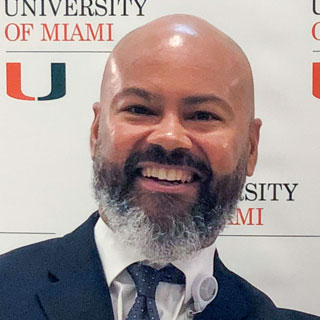 Maybe it’s the fact that Yuen comes from a long-standing military family—five uncles, three cousins, two brothers, and he have served—that he describes it as a privilege that he did two boot camps, one with the Navy and the other with the Marine Corps.
Maybe it’s the fact that Yuen comes from a long-standing military family—five uncles, three cousins, two brothers, and he have served—that he describes it as a privilege that he did two boot camps, one with the Navy and the other with the Marine Corps.Yuen joined the Navy as a corpsman. But because the Marines do not have a medical field, Navy corpsmen are sometimes assigned to serve in the Marines branch. “Because you’re going to be living with them, interacting and serving the Marines as a patient population, they want you to understand the Marines’ mentality,” he explained.
There was a marked contrast in the two trainings.
The Navy camp was more “gray matter”—learning everything about being a boatsman, what it’s like to live on a boat and live out of a duffle bag, how to stay afloat with your hands tied behind you in a pool for 10 minutes and how to hold your breath—while the Marine camp is all about physical toughness and resiliency. “Navy boot camp pales in comparison with that of the Marines,” he said.
Born and raised in Miami, Yuen said that both trainings taught him to appreciate new experiences and adapt to new situations.
“You get on a plane and land in a foreign city—everything is new and different—everything you’ve taken for granted is stripped away, and your work is to start building strong relationships with individuals you’ve never met before and whose backgrounds and cultures are different,” he explained. “Those first 24 hours are a culture shock for almost anyone, and then within 48 hours they’re telling you, ‘Look around, these are people you’re going to need to trust your life with.’ So, you start to have faith in humanity and your team members.”
Yuen said that experience was his biggest takeaway from boot camp and that, after leaving the military, he has applied those lessons wherever he goes.
“As soon as I get into a new situation, I start to understand who I’m working with, to respect the different cultures, and understand the richness of what they bring to the table,” he acknowledged. “And also, that we’re all on a common mission and vision, whatever the corporation’s is, and as long as we’re aligned with it and growing in the same direction, we’re going to succeed.”
It turned out that five of the same men that went through Navy boot camp with him were also corpsmen and so they all also went to the Marine boot camp. The same five men literally stayed together over the course of his four service years—and two of them remained in the service.
“We were from different cultures and learned so much from each other. One of the guys was an American Indian who played indigenous music, knew how to track by following footprints and watching the moon,” Yuen said. “He had a complete connection to the environment that none of us had—you really start to appreciate people’s differences and that enriches your life.”
Yuen pointed out that there are no snooze buttons in the military.
“The garbage can is thrown down the middle of the hallway at 4 a.m. and by 5 a.m. you’re on a run for 10 miles. There’s the adage that the military gets more done by 9 a.m. then most people do all day,” he emphasized.
So, he still wakes up as soon as the alarm sounds, and his feet hit the ground within seconds. “The day is started, and your goal should be to get as much as possible done early in the day because you never know what will come up,” he said.
Probably his most important takeaway from the military that he continues to share with his work teams is that of goal setting and celebrating successes.
He pointed out that in boot camp certain things are set—the squads are going to compete doing ‘X,’ then we’re going to do a five-mile run, then tie ropes, then shoot at the range, then a hike before dinner. The short-term goals and wins are celebrated when accomplished and they lead to long-term goals.
“With my teams I do the same thing. Set short-term goals, not daily but weekly or monthly. Then work toward quarterly, then annual goals. In supply, we strive for operational efficiency and as a work team to produce a better customer experience for our positions and clinicians,” Yuen said. “It would seem almost rudderless without these milestones that the military helps you create—though most of the time it’s really just in your mind, Still, when you hit it, you celebrate. Let everyone rejoice in the win. And if you don’t win, you learn from that and you adapt. So, failure is an essential component as well.”
A lot of what he learned in boot camp has translated into impacting his career and personal life, as well. “You set milestones and work toward goals and celebrate,” Yuen said. “Everything in my life is based upon this, from personal to professional to spiritual. That’s how I am.”
